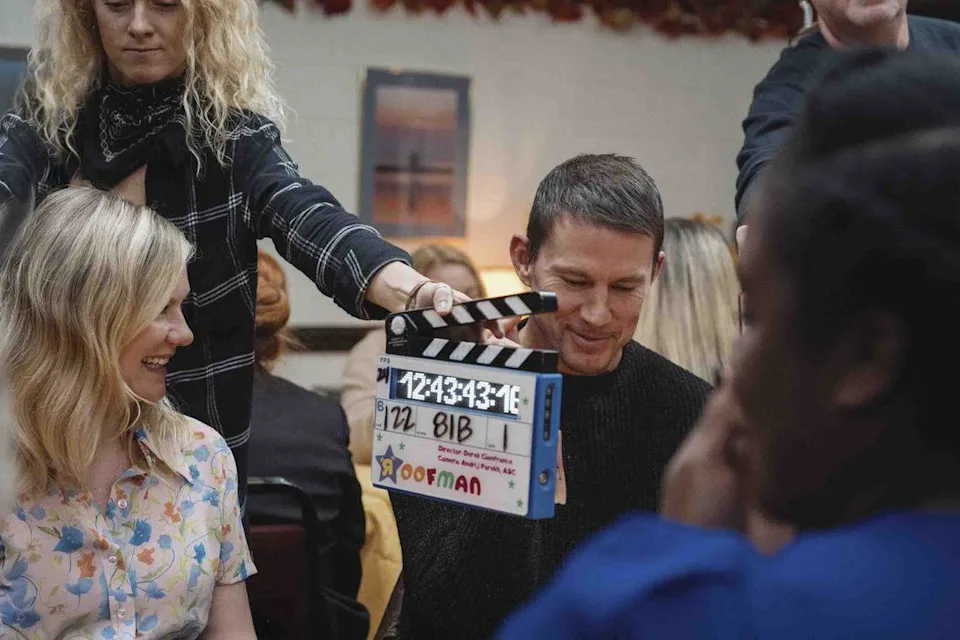In Roofman, Derek Cianfrance retools the familiar beats of a true-crime saga into something more hauntingly poetic—a romance scarred by bad choices, systemic failures, and the aching melancholy of lives suspended between desire and downfall. Based on the real-life exploits of Jeffrey Manchester, the so-called “Rooftop Robber” who escaped prison in the late 1990s and lived as a fugitive inside the shadows of suburban malls, the film refracts criminality through the prism of love. Starring Channing Tatum and Kirsten Dunst as unlikely lovers caught in the undertow of crime, Roofman is less a heist thriller than a doomed love letter, staged with Cianfrance’s trademark blend of intimacy and slow-burn tragedy.
The Real-Life Blueprint
Manchester’s spree of robberies, his 2004 prison break in North Carolina, and his ability to live undetected inside a Toys “R” Us and Circuit City captured tabloid imagination. But in Cianfrance’s hands, these incidents become less about sensationalism and more about the interiority of people driven to extremes. The director avoids the exploitative edge of true-crime television, focusing instead on psychological textures: the longing for reinvention, the desperation of escape, and the impossible hope of a “normal” life lived inside an abnormal situation.
Channing Tatum: Rugged Vulnerability
For Tatum, Roofman is a transformative performance. He channels the athletic bravado audiences associate with him into a character defined by fragility and improvisation. His Jeffrey is not a glamorous outlaw but a man searching for redemption through affection, constantly torn between instinctual survival and a yearning to build a home with Dunst’s character. In a career that has oscillated between comedic charm (21 Jump Street) and artistic risks (Foxcatcher), Roofmanrepresents the culmination of Tatum’s maturity as an actor—measured, pained, and imbued with an everyman relatability.
Kirsten Dunst: Melancholy Resilience
Opposite Tatum, Kirsten Dunst delivers one of her most resonant performances since Melancholia. She plays the small-town woman who becomes both enabler and conscience, swept into Jeffrey’s orbit while fully aware of the disaster looming ahead. Dunst, with her ability to project both warmth and quiet devastation, grounds the film’s emotional stakes. She gives the romance a lived-in authenticity that transcends cliché, infusing even stolen glances and whispered exchanges with emotional gravity.
View this post on Instagram
The Alchemy of Chemistry
Cianfrance’s camera lingers on the couple’s intimacy—shared meals, laughter in motel rooms, the quiet horror of realizing time is running out. What makes Roofman work is not the novelty of its caper but the palpable connection between Tatum and Dunst. Their chemistry is neither flashy nor performative; it is understated, seasoned, reflective of lives hardened by disappointment. Each scene together pulses with tenderness undercut by inevitability, as if their romance exists only on borrowed time.
A Supporting Cast of Outsiders
Beyond its central duo, Roofman boasts a remarkable supporting cast. LaKeith Stanfield injects an unpredictable energy as a detective obsessed with Jeffrey’s elusiveness, while Juno Temple appears as a local drifter whose friendship with Dunst’s character becomes both solace and complication. Peter Dinklage, in a small but pivotal role, brings sardonic wit as a cynical lawyer who sees the couple’s predicament as both absurd and tragic. These performances lend Roofman a textured ensemble dynamic, framing the lovers’ isolation against a broader canvas of community and institutions.
Cianfrance’s Aesthetic: The Romance of Ruin
Known for Blue Valentine and The Place Beyond the Pines, Derek Cianfrance crafts Roofman with the same aesthetic language: handheld intimacy, muted palettes, natural light, and long, deliberate takes. His films thrive on an almost documentary-like realism, where silence speaks as loudly as dialogue. Here, the malls, rooftops, and motel parking lots become more than settings—they become stages of a uniquely American loneliness. Cianfrance frames the banality of suburban landscapes as both prison and playground, emphasizing how ordinary spaces become extraordinary under duress.
Genre Subversion: Not Just a Heist Movie
While the premise suggests a classic heist thriller, Roofman deliberately subverts expectations. Robberies are rarely staged as set-piece spectacles; instead, they occur in fragments, seen through aftermath and tension rather than choreographed action. The focus is not the loot but the psychological toll. This narrative strategy destabilizes genre conventions, creating a hybrid: part romance, part noir, part social drama. For audiences expecting Heat or Ocean’s Eleven, Roofman might feel elliptical. But for those attuned to Cianfrance’s explorations of intimacy and despair, the film lands as a revelation.
Thematics
Thematically, Roofman is about contradictions. Jeffrey escapes prison only to confine himself in secret hideouts. He desires freedom yet binds himself through dependency on love. Dunst’s character longs for a life beyond monotony but finds herself trapped in cycles of complicity. The film suggests that true escape is impossible; at best, one can carve temporary sanctuaries—motel rooms, rooftop hideouts, fleeting moments of connection—that eventually collapse under the weight of reality.
Music and Mood
Cianfrance collaborates with musician Bryce Dessner of The National, whose score oscillates between hushed minimalism and brooding crescendos. The music underscores the film’s melancholy, never dominating but always simmering beneath. At key moments, silence replaces score, amplifying tension and emotional rupture. This sonic restraint mirrors the film’s visual sparseness, amplifying its mood of suspended inevitability.
Reception and Critique
Early festival reactions position Roofman as one of Cianfrance’s most ambitious yet divisive works. Admirers praise its emotional rawness, its haunting performances, and its refusal to play by genre rules. Detractors, however, criticize its pacing and opacity, arguing that its narrative feels too languid for a crime story. Yet this tension between expectation and execution is precisely what makes Roofman so distinct: it is a film uninterested in satisfying conventions, committed instead to carving its own melancholy niche.
No comments yet.








